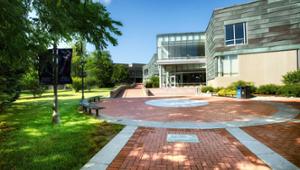Facilities
Three buildings are currently LEED Certified:
Historic renewable energy and/or conservation feasibility demonstration projects on campus have included:
- Solar panels at both the Kirner-Johnson Hall and Outdoor Leadership Center, providing a combined 40,000 kilowatt-hours of renewable energy annually;
- A windmill attached to the Kirner-Johnson Hall’s electrical grid; and
- A green roof at the List Center.
Sustainability in Action
Ground Source (Geothermal) Heat Pumps
Hamilton has installed geothermal systems for buildings in Skenandoa House, the atrium of the Taylor Science Center, the Sadove Student Center, the Wellin Museum of Art, and the Johnson Health and Wellness Center; further, work is underway for a new system that is part of the Root Hall renovation project.
Air Source Heat Pumps
Hamilton has also installed this type of system in the List Center.
Forest Management
The College is managing forests on nearly 1,000 acres of Hamilton-owned land in order to enhance carbon sequestration in trees and reforest open lands by planting carefully selected new trees that thrive in the area.
Electric Vehicle Charging Stations
Twenty (20) charge points are installed across campus.
Green Attributes
A project designed by five students that outlines how the College can use green landscaping as a tool to further Hamilton’s commitment to sustainability.
Related News

Sadove Center Awarded LEED Gold Certification
Hamilton was recently recognized for its efforts to go green, receiving LEED (Leadership in Energy and Environmental Design) Gold certification from the Green Building Certification Institute (GBCI) for the energy-efficient and sustainably constructed Sadove Student Center.

KJ Achieves LEED Gold Certification
Like other renovation and construction projects on campus, the Kirner-Johnson project includes energy-efficient mechanical systems, environmentally friendly materials and improved indoor environmental quality.
Contact
Contact Name
Brian Hansen
Director of Environmental Protection, Safety and Sustainability

